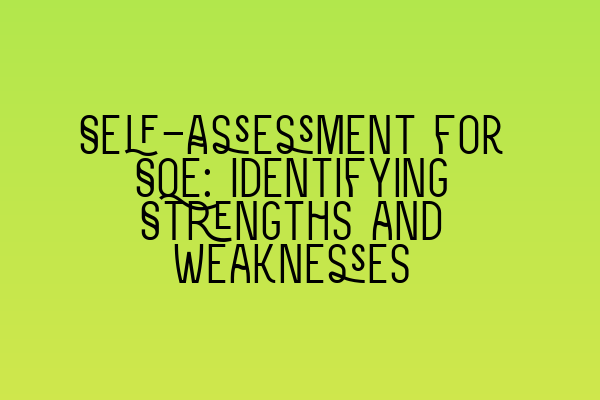Self-Assessment for SQE: Identifying Strengths and Weaknesses
Welcome to our comprehensive guide on self-assessment for the Solicitors Qualifying Examination (SQE). If you are an aspiring solicitor preparing for the SQE, it is essential to identify your strengths and weaknesses to effectively plan your study strategy. In this article, we will provide you with valuable insights and practical tips on how to conduct a thorough self-assessment for the SQE.
Why Self-Assessment Matters
Self-assessment plays a crucial role in your SQE preparation because it allows you to gain a clear understanding of your current knowledge and skills. By identifying your strengths, you can focus on reinforcing and building upon them. Similarly, by recognizing your weaknesses, you can allocate more time and resources to areas that require improvement. This targeted approach will ensure that you make the most efficient use of your study time and increase your chances of success in the SQE.
How to Conduct a Self-Assessment
1. Evaluate Your Legal Knowledge: The SQE tests your knowledge across various legal practice areas. Start by reviewing the SQE syllabus and identifying the subject areas that you are confident in and those that need more attention. Keep track of your assessment using a detailed checklist or spreadsheet, allowing you to visualize your progress and prioritize accordingly.
2. Analyze Your Legal Skills: The SQE also assesses your legal skills, such as legal research, drafting, and advocacy. Assess your proficiency in these areas by reviewing sample questions and past exam papers. Identify areas where you excel and areas that require improvement. Consider seeking guidance from experienced professionals or enrolling in skill-specific training programs.
3. Seek Feedback: Feedback from others, such as tutors, mentors, or study partners, can provide valuable insights into your strengths and weaknesses. Engage in discussions and mock examinations with peers to receive constructive criticism. Actively listen and reflect upon their feedback, incorporating it into your study plan.
4. Reflect on Past Performance: Review your academic and professional experiences and reflect on areas where you excelled and where you faced challenges. Consider how these experiences can inform your study strategy and help you tackle potential weaknesses in the SQE.
5. Set Goals: Use your self-assessment to set specific and achievable goals. Break down your study plan into smaller milestones, focusing on improving your weaknesses while simultaneously reinforcing your strengths. Regularly track your progress and celebrate your achievements along the way.
Additional Resources
To further enhance your understanding of the SQE and its requirements, we recommend exploring our related articles:
- LLC Formation Made Simple: Step-by-Step Guide for UK Entrepreneurs
- Delaware Corporate Law for UK Solicitors: Key Insights and Practices
- Complying with Legal Obligations: Delaware LLCs in the UK
- The SQE for International Lawyers: A Bridge to British Legal Practice
- Expert Insights: Solicitors in UK Courts – Tips and Strategies for Success
We hope that this guide has provided you with valuable insights into self-assessment for the SQE. By identifying your strengths and weaknesses, you can develop a targeted study plan that maximizes your chances of success. Remember, self-assessment is an ongoing process, so continuously reassess your progress and adjust your study strategy accordingly. Good luck on your SQE journey!

Leave a Reply